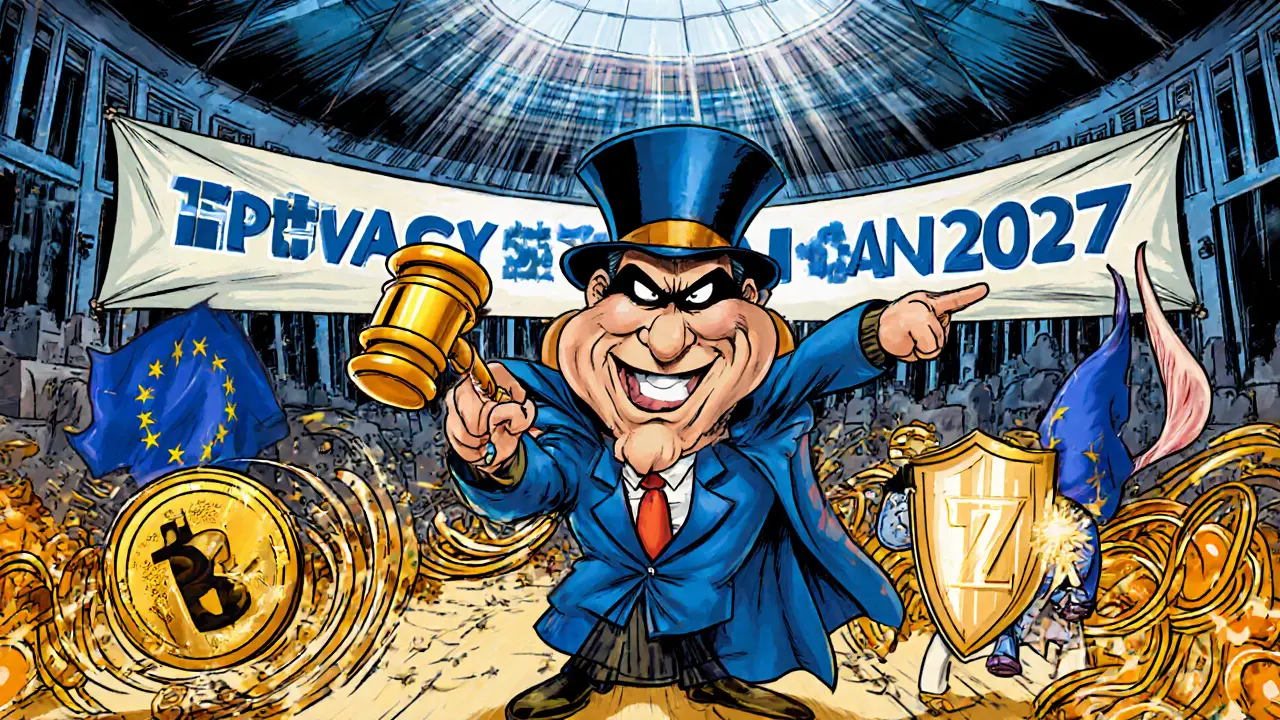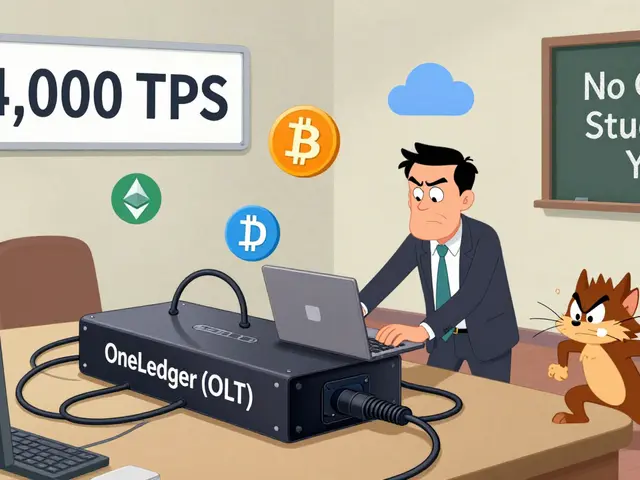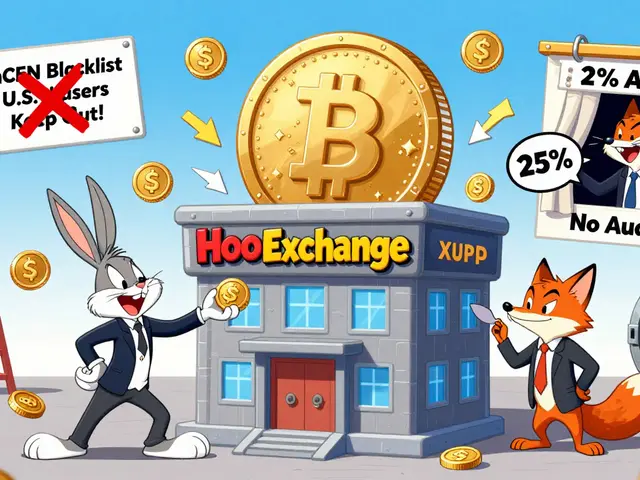
EU Privacy Coin Ban Impact Calculator
Enter your holdings and select a platform type, then click "Analyze Impact" to see how the EU privacy coin ban affects your assets.
Privacy Coin Comparison Table
| Feature | Monero (XMR) | Zcash (ZEC) |
|---|---|---|
| Privacy Mechanism | Ring signatures + stealth addresses | Zero-knowledge proofs (zk-SNARKs) |
| Default Transaction Type | Fully private (no option for transparent) | Transparent by default; shielded optional |
| Traceability | Untraceable - each output mixes with decoys | Shielded transactions hide all data; transparent ones are traceable |
| Regulatory Scrutiny | High - primary target of EU ban | High - included in EU ban despite optional privacy |
| Market Capitalization (Oct 2025) | ≈ $2.8 B | ≈ $1.4 B |
EU privacy coin ban is a regulatory move that will outlaw the handling of anonymous cryptocurrencies across the European Union starting July12027. The ban stems from Regulation2024/1624, which tightens anti‑money‑laundering (AML) requirements for crypto‑asset service providers (CASPs). The goal? To close the loophole that privacy‑focused coins like Monero (XMR) and Zcash (ZEC) create for illicit finance.
- Ban takes effect on July12027.
- Applies to all EU‑regulated exchanges, custodians, and fintech firms.
- Individual possession isn’t criminalised, but EU platforms must drop support.
- Key regulators: AMLA (Anti‑Money Laundering Authority) and European Banking Authority (EBA).
- Expect a market shift toward non‑EU venues and decentralized exchanges.
Why the EU is targeting privacy coins
The EU views anonymity as the biggest AML risk. Under Article79 of the new AML regulation, any "crypto‑asset account allowing anonymisation of transactions" is prohibited. Monero’s ring signatures and stealth addresses make each transaction indecipherable, while Zcash’s zero‑knowledge proofs hide sender, receiver, and amount. Regulators argue that this opacity prevents the detection of suspicious patterns, violating the EU’s mandate to protect its financial system from money‑laundering and terrorist financing.
Key regulatory players and their roles
European Union set the legislative framework. EUCI (European Crypto Initiative) drafted the AML Handbook that guides CASPs on compliance. AMLA will supervise the largest firms-about 40 entities processing over €50million or serving tens of thousands of customers-ensuring they shut down privacy‑coin services before the deadline. Meanwhile, the EBA translates the high‑level rules into enforceable standards through public consultations still ongoing as of May2025.
Technical clash: Privacy tech vs AML rules
Monero relies on ring signatures, which mix a user’s input with several decoys, and stealth addresses, which generate a one‑time destination for each transaction. This design guarantees that neither the sender nor the receiver can be linked to a specific output. Zcash, on the other hand, offers optional shielded transactions powered by zk‑SNARK zero‑knowledge proofs-mathematical arguments that verify a transaction’s validity without revealing its details. Both technologies achieve what traditional AML systems need: a clear audit trail. The EU’s solution is to outlaw the assets rather than force a technical redesign.
How the ban will be enforced
From July2027 onward, any CASP licensed under MiCA (Markets in Crypto‑Assets) must:
- Remove all listings, wallets, and payment channels for Monero, Zcash, Dash, and similar privacy‑coins.
- Implement identity‑verification (KYC) for crypto transfers above €1,000, keeping a full record of sender, receiver, amount, and timestamp.
- Report any attempted processing of privacy‑coins to AMLA within 24hours.
Failure to comply can result in fines up to 10% of annual revenue or revocation of the MiCA license.

Comparing Monero and Zcash: What makes them different?
| Feature | Monero (XMR) | Zcash (ZEC) |
|---|---|---|
| Privacy Mechanism | Ring signatures + stealth addresses | Zero‑knowledge proofs (zk‑SNARKs) |
| Default Transaction Type | Fully private (no option for transparent) | Transparent by default; shielded optional |
| Traceability | Untraceable - each output mixes with decoys | Shielded transactions hide all data; transparent ones are traceable |
| Regulatory Scrutiny | High - primary target of EU ban | High - included in EU ban despite optional privacy |
| Market Capitalisation (Oct2025) | ≈$2.8B | ≈$1.4B |
What this means for users and investors
If you hold Monero or Zcash in a wallet linked to an EU‑registered exchange, you’ll need to withdraw before the cut‑off date. Non‑EU platforms and decentralized exchanges (DEXs) remain legal gateways, but expect higher transaction fees and slower settlement as liquidity migrates. For businesses, the ban forces a strategic decision: either relocate crypto‑service operations to jurisdictions outside the EU or pivot to compliant assets such as Bitcoin, Ethereum, or stablecoins.
An important nuance: the ban does **not** criminalise private possession. European citizens can still store XMR or ZEC on personal hardware wallets, provided they don’t use EU‑regulated services to move the coins. This creates a regulatory arbitrage where activity may shift toward decentralized, peer‑to‑peer networks that fall outside AMLA’s supervisory reach.
Potential global ripple effects
Regulators in the United States, United Kingdom, and several Asian economies are watching the EU’s approach closely. The comprehensive nature-covering both exchange‑level listings and service‑provider obligations-offers a template that could be replicated elsewhere. If other major economies adopt similar bans, privacy‑coin markets could shrink dramatically, consolidating crypto activity around transparent assets.
Preparing for the July2027 deadline
Here’s a quick checklist for anyone affected:
- Audit your holdings: Identify any Monero or Zcash stored on EU‑licensed platforms.
- Plan withdrawals: Transfer to personal wallets or non‑EU exchanges before the deadline.
- Update compliance policies: If you run a crypto business, revise KYC/AML procedures to exclude privacy coins.
- Monitor regulatory updates: The EBA will release detailed technical standards through public consultations; stay informed.
- Consider diversification: Shift a portion of your portfolio to assets that meet AML standards to avoid forced liquidation.
Future outlook for privacy‑enhancing technology
While the EU ban curtails mainstream use of Monero and Zcash, research into regulatory‑friendly privacy solutions continues. Projects that embed selective disclosure-where users can prove compliance without revealing full transaction details-may eventually satisfy both privacy advocates and regulators. Until then, the EU’s privacy coin ban sets a clear boundary for the next two years.

Frequently Asked Questions
Will individuals be arrested for holding Monero or Zcash in the EU?
No. The regulation targets service providers, not private ownership. You can keep XMR or ZEC in a personal wallet; you just can’t use EU‑licensed exchanges to trade them after July2027.
What happens to existing Monero/Zcash listings on EU exchanges?
All EU‑registered platforms must delist the coins, disable deposits and withdrawals, and notify users to move their funds before the deadline. Failure to comply can lead to hefty fines or license revocation.
Can a non‑EU crypto business still support Monero?
Yes, provided the business is not subject to MiCA or AMLA supervision. Companies operating outside the EU can continue offering privacy‑coin services, though they may face restrictions when serving EU residents.
How will the ban affect the price of Monero and Zcash?
Historically, regulatory news creates short‑term volatility. Since the ban only restricts EU platforms, prices have shown moderate dips but remain sensitive to global demand. Expect continued fluctuation as users relocate assets to non‑EU venues.
Are there any alternatives that offer privacy without breaking AML rules?
Selective‑disclosure protocols like zk‑rollups and confidential transactions aim to reveal only what regulators need (e.g., proof of legitimacy) while keeping other details hidden. They are still experimental but could become the next compliance‑friendly privacy solution.





